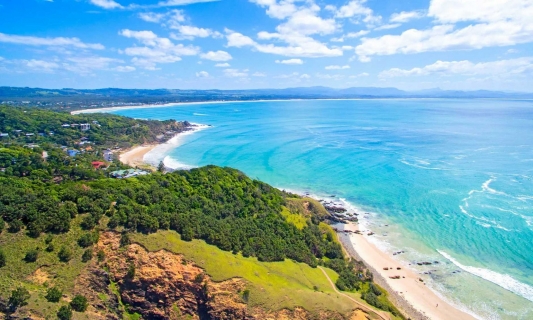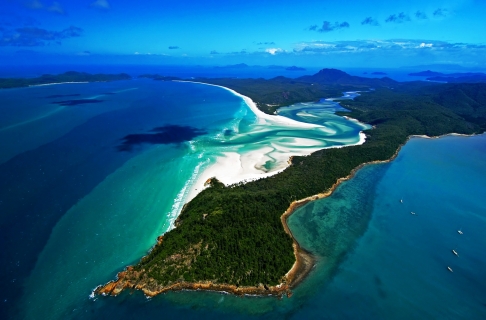Byron Bay, Australia - Weather and Climate
Byron Bay enjoys a subtropical climate with hot, wet summers and mild, dry winters. It´s mild, temperate climate makes it a perfect place to holiday year round. The summer months are December, January and February. February is usually the hottest and most humid. Winters are not cold with daily maximums usually reaching a pleasant 19.4°C and a minimum of 11°C.
Byron Bay is the ideal beach holiday destination. In general it is a pleasant place to be. Winters are mainly dry and sunny. During the summer chances of rain are higher. Especially evenings can be wet, cooling the day down making for a comfortable overnight temperature.
Fun fact: From June to September you can spot large Humpback whales.
Average maximum day and minimum night temperature
The weather in Byron Bay changes moderately throughout the year, offering enough variation to appreciate each season. On average, daytime temperatures range from a comfortable 28°C in January to a pleasant 20°C in July.
Nighttime temperatures can drop, with average lows reaching 13°C in July.Check out our detailed temperature page for more information.
Temperature ranges by month
Precipitation and rainy days
Byron Bay experiences significant rainfall throughout the year, averaging 1332 mm of precipitation annually. The seasons in Byron Bay, bring significant changes in precipitation. The wettest month, February, receives heavy rainfall, with an average of 172 mm of precipitation. This rainfall is distributed across 14 rainy days.
In contrast, the driest month, September, experiences much less rainfall, totaling 51 mm over 8 rainy days. These distinct seasonal differences provide diverse experiences throughout the year. For more details, please visit our Byron Bay Precipitation page.The mean monthly precipitation over the year, including rain, hail and snow
Sunshine over the year
Byron Bay enjoys sunny spells year-round. October sees up to 8.7 hours of daily sunshine, perfect for a sunny trip. June, the least sunny month, still offers a generous 6.3 hours of sun despite this cloudier time of the year.
Visit our detailed sunshine hours page for more information.
Monthly hours of sunshine
Daily hours of sunshine
Average water temperature
The mean water temperature over the year ranges from 22°C in July to 26°C in February.
Water temperature over the year
Forecast for Byron Bay



Select a Month of Interest
Check the conditions for any month of the year.
The best time of year to visit Byron Bay in Australia
During the months of April, May, June, July, August, September, October and November you are most likely to experience good weather with pleasant average temperatures that fall between 20°C and 26°C.Other facts from our historical weather data:
January has an average maximum temperature of 28°C and is the warmest month of the year.
The coldest month is July with an average maximum temperature of 20°C.
February tops the wettest month list with 172 mm of rainfall.
September is the driest month with 51 mm of precipitation.
October is the sunniest month with an average of 260 hours of sunshine.
No idea where to travel to this year? We have a tool that recommends destinations based on your ideal conditions. Find out where to go with our weather planner.



